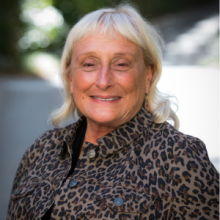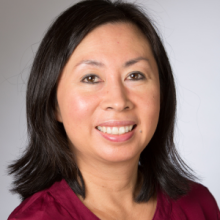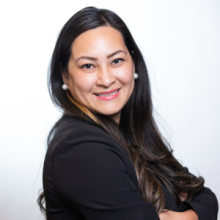
Meeting the Demand for More Nurse Leaders to Advance Care
The UCSF School of Nursing is expanding its doctoral programs to meet the demand for more nurse leaders who will develop and steer innovative changes in an increasingly complex health care arena and transform health for the better.
The expansion responds to a national call for more doctorally prepared nurses by increasing the pathways for nurses to attain the profession’s highest clinical degree: the Doctor of Nursing Practice (DNP).
“With their unique perspectives and insights, nurses need to be fully engaged at the decision-making table in improving the quality of care,” said Mary Lynch, DNP, MPH, FAAN, associate dean for education programs. “By expanding the pathways in our DNP program, we will equip more nurses with the knowledge and skills to innovate and lead positive change in our health systems.”

The school opened the application cycle this month for its DNP program, with two distinct pathways:
- The new BSN Entry to DNP — Advanced Nursing Focus pathway enables individuals with a bachelor’s degree in nursing to become experts and leaders in health equity. Applicants will master the skills in one of 10 advanced specialties and complete their studies toward the DNP degree. The school expects to welcome its first cohort in June 2024, pending approval from the California Board of Registered Nursing.
- The existing Post-Master’s Entry to DNP — Leadership Focus pathway prepares registered nurses who hold a master’s degree with the skills to innovate improvements and lead teams in developing approaches to care that address population needs.
The school continues to offer the PhD degree in both Nursing and Sociology to those seeking to advance research and science. In addition, the Master of Science in Health Administration and Interprofessional Leadership program prepares individuals in clinical and non-clinical health care areas to lead interprofessional teams.
The Future of Nursing is a Doctorally Prepared Nurse
The country’s complex health systems and underserved communities are calling for the highest levels of scientific knowledge and clinical expertise to deliver the best in patient care.
In 2011, the Institute of Medicine of the National Academies issued a landmark report that recommended doubling the number of doctorally prepared nurses to meet the growing demand for care and to improve the health care system.
The UCSF School of Nursing’s expansion of its DNP program responds to this need and is part of a nationwide movement to produce more nurse leaders. Nursing organizations, such as the National Organization of Nurse Practitioner Faculties, have called for nursing schools to shift all entry-level nurse practitioner education to the DNP degree by 2025.

UCSF expects to graduate over 120 doctorally prepared nurses per year through its new BSN Entry to DNP — Advanced Nursing Focus pathway, on top of those graduating from its existing Post-Master’s Entry to DNP — Leadership Focus pathway.
“DNP-prepared APPs possess advanced clinical knowledge and skills that enable them to critically analyze complex health care situations. This expertise allows them to make well-informed decisions and lead teams in delivering evidence-based care,” said Ivette Becerra-Ortiz, DNP, chief of Advanced Practice Providers at UCSF Health. “The DNP curriculum equips APPs with the skills and knowledge needed to address the complicated health care challenges of today and tomorrow.”
In addition, nurses with the DNP degree can bridge the gap between research findings and patient care, ensuring that the latest research evidence is incorporated into treatment plans and protocols, Becerra-Ortiz said. They are also trained to identify and address systemic issues that affect patient care, collaborate interprofessionally, and design, implement and evaluate quality improvement initiatives.
DNP programs prepare nurses for careers in clinical leadership, with many serving as health care administrators and managers at the top of their organizations where they shape policy and resource decisions. They also excel in roles in health policy and academia.


New Pathway Enables Nurses to Master a Specialty and Achieve the DNP
The school’s new BSN Entry to the DNP pathway replaces its Master of Science program in which students prepared for the specialty of their choice and graduated with a master’s degree. In contrast, the new pathway prepares nurses beyond the master’s level. Equipped with the profession’s highest clinical degree, nurses will be poised to lead improvements and transform health care for diverse communities.

“The standards of NP education are changing, and the DNP is going to be the new standard in 2025 and beyond,” said Miranda Surjadi, MS, RN, ANP, who directs the school’s Adult Gerontology Primary Care Nurse Practitioner specialty. “Within the new BSN Entry to DNP pathway, we still offer the specialization into advanced specialty tracks — and you will also have the added leadership skills to lead clinical excellence or to contribute to management.”
Under the new pathway, applicants with a bachelor’s degree in nursing will choose from specialties, ranging from adult-gerontology and family nurse practitioner to clinical nurse specialists and pediatric care. The specialty options include health policy-public health; UCSF is one of the very few nursing schools nationwide to offer this specialty.
The curriculum places an emphasis on nursing leadership, evidence-based practice, improving health quality and standards of care, and financial stewardship.
A core component of the degree program is the DNP quality improvement project, in which students identify a health care practice issue and formulate a solution that improves clinical outcomes.
Lourdes Moldre, MS, RN, ACNP, nurse executive patient care director of Adult Services Acute Care at the UCSF Medical Center at Mount Zion, earned her master’s degree at the UCSF School of Nursing in 2008. She plans to return for her DNP degree in fall 2024.
“What is motivating me to go back to school is my goal to become a chief nursing officer,” she said. “Having a DNP would put me in a higher tiered caliber in my field and will give me additional tools to excel in leadership and hospital operations. Additionally, it will give me more optimized skills in terms of operationalizing projects, mentorship/coaching, growth strategies and innovating the next wave of services.”
If the BSN Entry to DNP — Advanced Nursing Focus pathway had been offered when she was pursuing her master’s degree, Moldre said she would have applied.

“I knew I wanted to have a higher degree eventually when I first became a registered nurse,” she said. “I have three children now but I did not have kids at the time I was getting my master’s back in 2006. If there was a more aligned pathway going straight to the DNP during that time, I would have picked that pathway straight to DNP for sure.”



